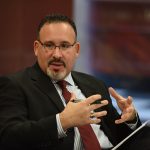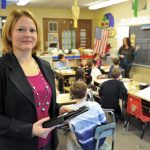With the pandemic projected to set women back a decade in the workplace, we take listener calls and talk with two working mothers about how their lives have been affected this past year. We’re joined by Quiana Agbai, a Boston parent, entrepreneur, and author of the blog and Instagram account “Harlem Love Birds,” and Jennie Weiner, a Somerville parent and associate professor of educational leadership at the University of Connecticut.
Neag School faculty members and other colleagues are co-authors of a new study, recently published in the Journal of Postsecondary Education and Disability, that examined the impact of the rapid transition to online learning during the spring 2020 academic semester on college students with disabilities. The researchers conducted a national survey of more than 340 students in both two and four-year programs to measure the perceptions of college students with disabilities about their experiences.
From a young age, Madison Corlett ’16 (ED), ’17 MA, was excited about helping others, raising money through lemonade stands and other fundraisers, then donating the money to local causes.
Sandra M. Chafouleas, Board of Trustees Distinguished Professor and Neag Endowed Professor in the Department of Educational Psychology at the University of Connecticut, said experts are seeing an increase in concern about mental health and emotional well-being, especially among teenagers who may be missing opportunities to pursue interests, social connection and independence, at a time when communities are also facing serious economic and health impacts.
A program specialist for University Events and Conference Services at the University of Connecticut, alumna Anne Hill ’90 (CLAS), ’92 MA, has been planning events across campus for nearly 24 years. When the COVID-19 pandemic hit last spring, Hill and her team had to uproot the strategies they had been using to design in-person events and pivot to online platforms.
“I think it just revealed some of the deep inequities that have existed but didn’t really surface until it was forced to,” says Neag Professor of Educational Policy Casey Cobb. “So that was one of the main things that we’ve learned. I think a lot of schools adjusted very quickly and really made new efforts and creative efforts to keep contact with their families and their kids — with home visits in a safe manner and bringing food to families in need.”
President Joe Biden’s nominee for U.S. Secretary of Education, Neag School alumnus and Connecticut’s Education Commissioner Miguel Cardona ’01 MA, ’04 6th Year, ’11 Ed.D., ’12 ELP, was officially confirmed on March 1, 2021, by the U.S. Senate. He is the first UConn graduate in history to hold a Cabinet-level position in the White House.
Sandra Chafouleas, Board of Trustees Distinguished Professor and Neag Endowed Professor of educational psychology and founder of the Collaboratory on School and Child Health (CSCH), spoke with Julie Bartucca of the UConn 360 podcast about ways parents can support their children’s well-being during this time, as well as about how to talk to kids about the upheaval going on in the U.S.
“As science teacher educators committed to making science relevant to students’ lives and consequential in the pursuit of justice, we highlight how science intersects with society, especially how science is represented and made accessible through the media,” writes co-author Todd Campbell.
Nearly a year since the nation went into lockdown due to the COVID-19 pandemic, just about everyone is struggling to maintain a semblance of normality. Parents of school-aged children have taken to social media and countless news stories have been written on the difficulties of balancing remote learning with remote working.





